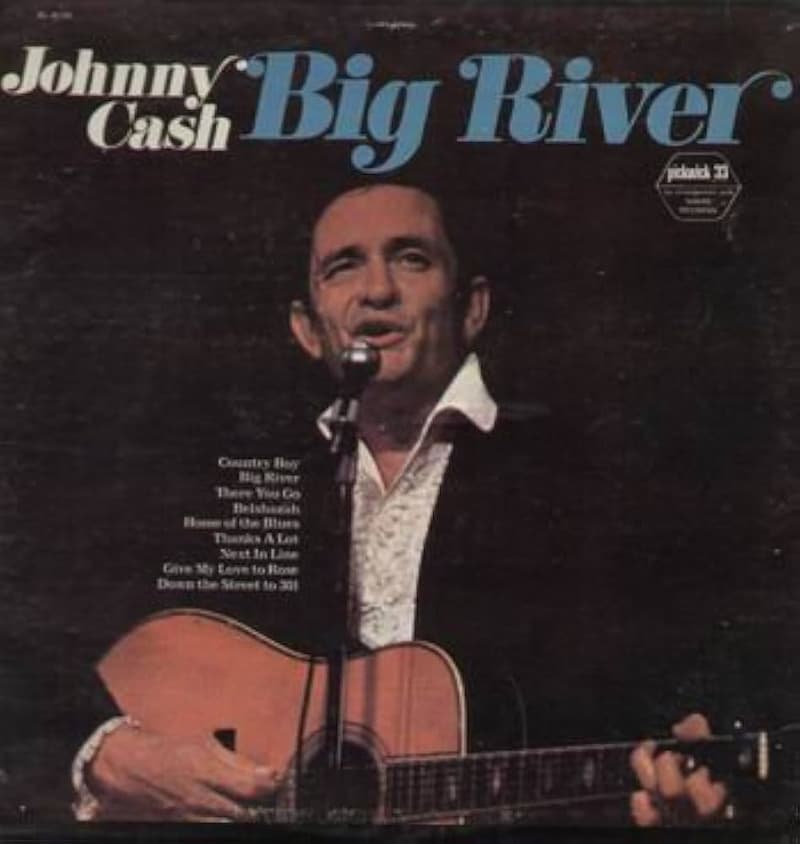
About The Song
“Big River” was written by Johnny Cash in 1957, inspired by a trip along the Mississippi River and his fascination with its vastness and the transient life it symbolized. Cash composed the song during his time at Sun Records, drawing on his experiences traveling as a rising artist. It was recorded on November 12, 1957, at Sun Studio in Memphis, Tennessee, produced by Sam Phillips and Jack Clement. The track was released as a single in December 1957 by Sun Records, with “Ballad of a Teenage Queen” as the A-side, and later included on the album Sings the Songs That Made Him Famous, released in November 1958. The song, running 2:32, is a country-rockabilly track featuring Cash’s deep vocals, Luther Perkins’ iconic guitar, and Marshall Grant’s bass.
As the B-side to “Ballad of a Teenage Queen,” “Big River” did not chart independently on the Billboard Top Pop Singles (Hot 100 equivalent) in 1957, as B-sides were not separately tracked then. However, “Ballad of a Teenage Queen” reached number 1 on the Billboard Best Sellers in Stores (country) chart and number 14 on the pop chart, with “Big River” contributing to the single’s popularity. A live version from Cash’s 1968 album At Folsom Prison gained significant attention but was not released as a single. Internationally, the original single had limited chart impact, peaking at number 20 in Canada’s CHUM Chart. Cash Box described “Big River” as a “rollicking, storytelling tune” with “raw, driving energy,” noting its appeal to country fans.
Background details include Cash’s inspiration from the Mississippi River’s cultural and geographic significance, with lyrics tracing a narrator’s pursuit of a lost love along its banks from St. Paul to New Orleans. The song was recorded in a single session with the Tennessee Two, capturing their signature sparse sound. Covers include versions by The Grateful Dead (1980), Rosanne Cash (1980), and Colin Linden (2003). Cash performed it on The Johnny Cash Show in 1969 and at his 1958 Grand Ole Opry debut. No major controversies surrounded the song, though its narrative of restless wandering reflected Cash’s own struggles with fame and personal life at the time.
Expert commentary includes AllMusic’s Stephen Thomas Erlewine, who called it a “quintessential Cash track” for its vivid storytelling and rhythmic drive. Songfacts noted its role in showcasing Cash’s ability to blend regional imagery with universal themes. Rolling Stone praised its “cinematic quality,” likening it to a road movie in song form. The track’s inclusion in the At Folsom Prison performance added to its legend, with inmates’ cheers enhancing its raw appeal. Its use in the 1984 film The River Rat and a 2006 episode of CMT Crossroads with The Allman Brothers Band highlights its enduring influence in country music.
Video
Lyric
Now I taught the weeping willow how to cry
And I showed the clouds how to cover up a clear blue sky
And the tears that I cried for that woman are gonna flood you, Big River
Then I’m gonna sit right here until I dieI met her accidentally in St. Paul, Minnesota
And it tore me up every time I heard her drawl, Southern drawl
Then I heard my dream was back downstream cavortin’ in Davenport
And I followed you, Big River, when you calledThen you took me to St. Louis later on down the river
A freighter said she’s been here, but she’s gone, boy, she’s gone
I found her trail in Memphis, but she just walked up the bluff
She raised a few eyebrows and then she went on down aloneNow, won’t you batter down by Baton Rouge, River Queen, roll it on
Take that woman on down to New Orleans, New Orleans
Go on, I’ve had enough, dump my blues down in the Gulf
She loves you, Big River, more than meNow I taught the weeping willow how to cry, cry, cry
And I showed the clouds how to cover up a clear blue sky
And the tears that I cried for that woman are gonna flood you, Big River
Then I’m gonna sit right here until I die